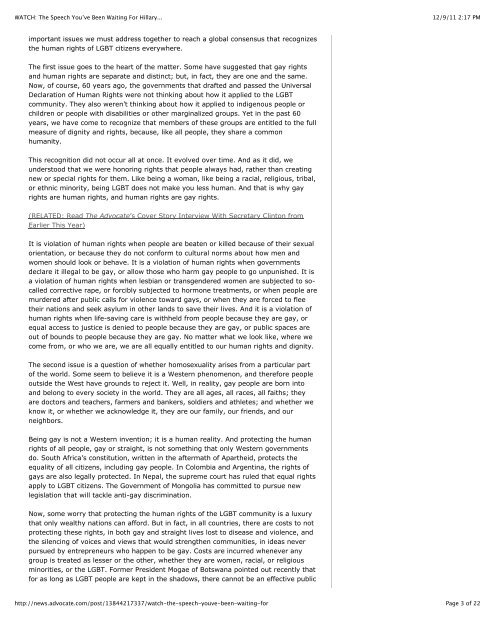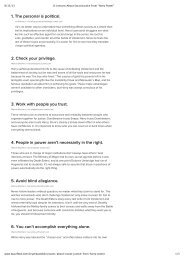Secretary of State Hillary Rodham Clinton Advocating ... - ODEC Home
Secretary of State Hillary Rodham Clinton Advocating ... - ODEC Home
Secretary of State Hillary Rodham Clinton Advocating ... - ODEC Home
You also want an ePaper? Increase the reach of your titles
YUMPU automatically turns print PDFs into web optimized ePapers that Google loves.
WATCH: The Speech You’ve Been Waiting For <strong>Hillary</strong>...<br />
12/9/11 2:17 PM<br />
important issues we must address together to reach a global consensus that recognizes<br />
the human rights <strong>of</strong> LGBT citizens everywhere.<br />
The first issue goes to the heart <strong>of</strong> the matter. Some have suggested that gay rights<br />
and human rights are separate and distinct; but, in fact, they are one and the same.<br />
Now, <strong>of</strong> course, 60 years ago, the governments that drafted and passed the Universal<br />
Declaration <strong>of</strong> Human Rights were not thinking about how it applied to the LGBT<br />
community. They also weren’t thinking about how it applied to indigenous people or<br />
children or people with disabilities or other marginalized groups. Yet in the past 60<br />
years, we have come to recognize that members <strong>of</strong> these groups are entitled to the full<br />
measure <strong>of</strong> dignity and rights, because, like all people, they share a common<br />
humanity.<br />
This recognition did not occur all at once. It evolved over time. And as it did, we<br />
understood that we were honoring rights that people always had, rather than creating<br />
new or special rights for them. Like being a woman, like being a racial, religious, tribal,<br />
or ethnic minority, being LGBT does not make you less human. And that is why gay<br />
rights are human rights, and human rights are gay rights.<br />
(RELATED: Read The Advocate’s Cover Story Interview With <strong>Secretary</strong> <strong>Clinton</strong> from<br />
Earlier This Year)<br />
It is violation <strong>of</strong> human rights when people are beaten or killed because <strong>of</strong> their sexual<br />
orientation, or because they do not conform to cultural norms about how men and<br />
women should look or behave. It is a violation <strong>of</strong> human rights when governments<br />
declare it illegal to be gay, or allow those who harm gay people to go unpunished. It is<br />
a violation <strong>of</strong> human rights when lesbian or transgendered women are subjected to socalled<br />
corrective rape, or forcibly subjected to hormone treatments, or when people are<br />
murdered after public calls for violence toward gays, or when they are forced to flee<br />
their nations and seek asylum in other lands to save their lives. And it is a violation <strong>of</strong><br />
human rights when life-saving care is withheld from people because they are gay, or<br />
equal access to justice is denied to people because they are gay, or public spaces are<br />
out <strong>of</strong> bounds to people because they are gay. No matter what we look like, where we<br />
come from, or who we are, we are all equally entitled to our human rights and dignity.<br />
The second issue is a question <strong>of</strong> whether homosexuality arises from a particular part<br />
<strong>of</strong> the world. Some seem to believe it is a Western phenomenon, and therefore people<br />
outside the West have grounds to reject it. Well, in reality, gay people are born into<br />
and belong to every society in the world. They are all ages, all races, all faiths; they<br />
are doctors and teachers, farmers and bankers, soldiers and athletes; and whether we<br />
know it, or whether we acknowledge it, they are our family, our friends, and our<br />
neighbors.<br />
Being gay is not a Western invention; it is a human reality. And protecting the human<br />
rights <strong>of</strong> all people, gay or straight, is not something that only Western governments<br />
do. South Africa’s constitution, written in the aftermath <strong>of</strong> Apartheid, protects the<br />
equality <strong>of</strong> all citizens, including gay people. In Colombia and Argentina, the rights <strong>of</strong><br />
gays are also legally protected. In Nepal, the supreme court has ruled that equal rights<br />
apply to LGBT citizens. The Government <strong>of</strong> Mongolia has committed to pursue new<br />
legislation that will tackle anti-gay discrimination.<br />
Now, some worry that protecting the human rights <strong>of</strong> the LGBT community is a luxury<br />
that only wealthy nations can afford. But in fact, in all countries, there are costs to not<br />
protecting these rights, in both gay and straight lives lost to disease and violence, and<br />
the silencing <strong>of</strong> voices and views that would strengthen communities, in ideas never<br />
pursued by entrepreneurs who happen to be gay. Costs are incurred whenever any<br />
group is treated as lesser or the other, whether they are women, racial, or religious<br />
minorities, or the LGBT. Former President Mogae <strong>of</strong> Botswana pointed out recently that<br />
for as long as LGBT people are kept in the shadows, there cannot be an effective public<br />
http://news.advocate.com/post/13844217337/watch-the-speech-youve-been-waiting-for<br />
Page 3 <strong>of</strong> 22




